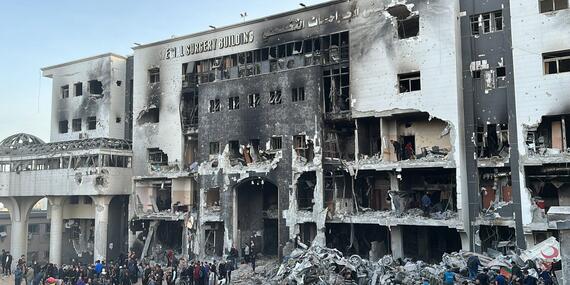Today's top news: Occupied Palestinian Territory, Haiti

Occupied Palestinian Territory
The Under-Secretary-General for Humanitarian Affairs, Martin Griffiths, said attempts to sideline United Nations Relief and Works Agency for Palestine Refugees in the Near East (UNRWA) must stop.
In a social media post yesterday, Mr. Griffiths underscored that UNRWA is the backbone of the humanitarian operation in Gaza – and that any effort to distribute aid without them is simply doomed to fail.
UNRWA is the largest humanitarian organization in Gaza. The agency reported today that it has provided nearly 3.6 million patient consultations in Gaza since the 7 October. More than 1.8 million people – that’s 85 per cent of Gaza’s population – have received flour, and nearly 600,000 people have gotten emergency food parcels. UNRWA also continues to provide storage and distribution capacity for other agencies’ food commodities.
We have seen reports that Israeli forces have vacated the premises of Al Shifa Hospital in Gaza city. The UN is planning a mission to Al Shifa as soon as allowed to help people receive medical attention and to assess the facility.
In a social media post yesterday, the Director-General of the World Health Organization (WHO), Dr. Tedros Adhanom Ghebreyesus, said 21 patients had died since Al Shifa came under siege on March 18th. He added that as of Saturday, just one bottle of water remained for every 15 people at the hospital, and food was extremely limited.
Meanwhile, at Al Aqsa Hospital in central Gaza, a WHO team was conducting a humanitarian mission there yesterday when a tent camp inside the hospital compound was hit by an Israeli airstrike. Four people were reportedly killed and 17 others injured. All WHO staff are accounted for.
Dr. Tedros said the team was at the hospital to assess needs and collect incubators to be sent to northern Gaza. He called for the protection of patients, health personnel and humanitarian missions – and said ongoing attacks and militarization of hospitals in Gaza must stop.
Haiti
Our partners continue to provide daily emergency assistance to people affected by the violence that broke out in the capital Port-au-Prince a month ago.
On Saturday, 30 March, the World Food Programme (WFP) provided more than 28,000 meals to people who have fled their homes.
Despite the widespread insecurity, WFP reports that it has delivered food aid to some 480,000 people across the country since the beginning of March, including school meals for students. These efforts were possible thanks to our partners – including Haitian NGOs, local businesses and organizations of farmers.
In Port-au-Prince, WFP has distributed more than 358,000 hot meals to more than 69,000 people in 48 displacement sites over the past month.
WFP’s Representative in Haiti, Jean-Martin Bauer, says aid must be scaled up – but to do that, we need security, access, and funding.
Over the past month, our humanitarian partners have delivered more than 2.3 million litres of water to nearly 29 displacement sites, benefiting more than 60,000 displaced people. Health partners have also delivered medicines and provided psychosocial support to traumatized people, including children.
Haiti’s health sector has been severely affected by the violence over the past month, with at least half of the health facilities in the capital either closed or functioning below their normal capacities.
The ongoing insecurity in Haiti has worsened the already dire humanitarian situation. Across the country, more than 362,000 people are currently displaced – some 160,000 of whom are in the Port-au-Prince metropolitan area. More than 1,000 schools have closed across the country.
Meanwhile, this year’s Humanitarian Needs and Response Plan for Haiti is still severely underfunded. Only US$45 million of the $674 million has been received – that’s less than 7 per cent.
